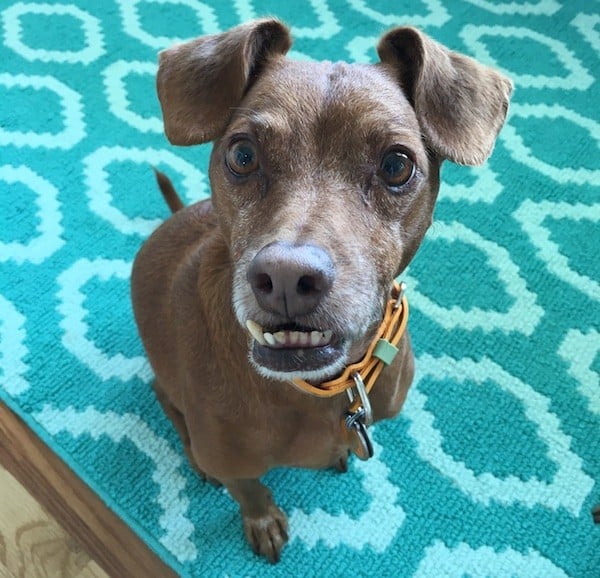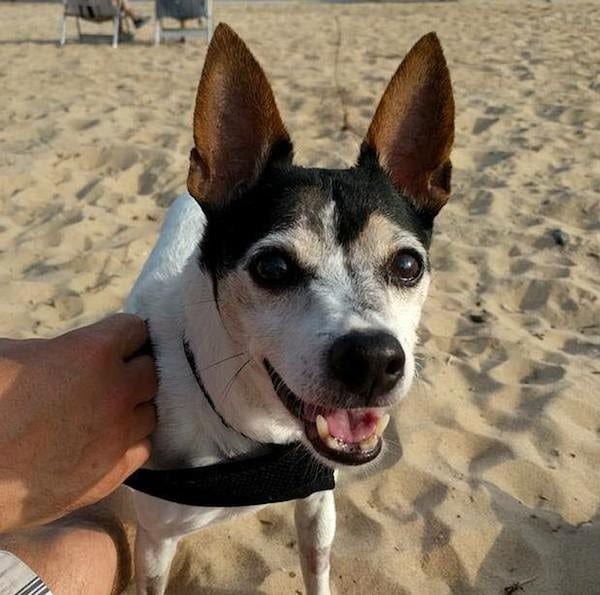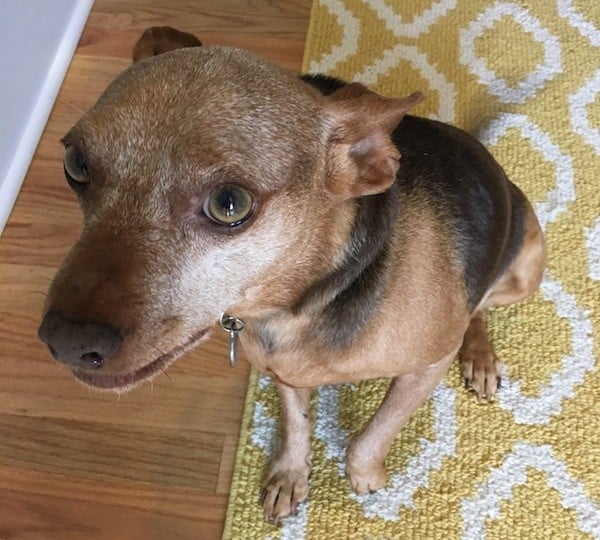I was at the veterinarian’s office with my dog Tampa Bay when a woman, waiting to be checked out, turned to me and said, “What a sweet senior. He’s an old one isn’t he?”
I found myself struggling to be civil. “He’s actually not that old,” I said. “And besides, we don’t talk about that.” Then I forced myself to half joke, “I prefer to live in denial.”
It’s hard enough for us to deal with our own mortality as we pass the big-one birthdays, but when it comes to our beloved pets, who have much shorter lifespans, it can be quite painful.
Tampa Bay is 9 years old. He is a small hound mix so it’s not like he’s going to be bounding over that rainbow bridge any time soon. However, it’s not far from my mind because I’ve been dealing with “senior” comments for the past few years. Tampa went white around his face pretty fast. Of course, I panicked and immediately started researching, and it seems it’s not uncommon for “red” coated dogs (dogs with the pigment phaeomelanin) to go white way before their senior years.

Tampa Bay’s muzzle started turning white while he was still an adult, causing people refer to him as “senior” even though he wasn’t. (Photo by Melissa Kauffman)
There is also something called geriatric greying that happens in dogs, and there are a lot of reasons for your dog to start going white or gray. Not all dogs who have white or gray muzzles are older dogs — some apparently get them as young as 2 years old. (So if you see someone whose dog has a white or gray muzzle, don’t whip out your “senior” comments before asking their age.)
I really wish there was another word for senior. I mean, Tampa was a puppy and then an adult for just a few years before plopping into that senior category at my vet. He didn’t even get to have a midlife crisis! Senior just isn’t the right word to describe a happy and loving dog who doesn’t have the frenetic energy but is still very much engaged with us and his world — and treats, especially treats.
And the classification of “senior” doesn’t help dogs when it comes to adoption either. The word “senior” makes people hesitate, and hesitation can make all the difference when a dog is desperately trying to find his forever home.
Because of this, special groups had to be created to help senior dogs. One of these groups is The Grey Muzzle Organization, which provides funding and resources to animal shelters to help them with their “mature” dogs. In fact, Grey Muzzle just announced its grant recipients for 2016 — $225,000 in funding for senior dog programs at 38 organizations nationwide. The organization’s vision is “of a world where no old dog dies alone and afraid.”

Rainbow Friends Animal Sanctuary on the Big Island of Hawaii received a 2016 grant from The Grey Muzzle Organization. This sanctuary treats dogs like 13-year-old Pono (who just found a forever home!) to therapeutic swimming pool visits as part of their medical care. (Photo courtesy The Grey Muzzle Organization)
I asked Grey Muzzle’s Executive Director, Lisa Lunghofer, Ph.D., what’s the biggest concern for people regarding adopting older dogs?
“It’s sometimes harder for older dogs to get adopted because people are concerned about potential medical costs,” she said. “Many of our grantees provide additional medical screening, such as blood work, so that adopters feel more confident that they can meet a senior dog’s health needs. The shelter environment is also very hard on senior dogs. Not only is it stressful, but concrete floors are particularly unforgiving for older dogs’ arthritic joints. That’s why we’re so pleased to donate orthopedic beds to shelters nationwide.”
Having two dogs that are technically “senior dogs” and having had our beloved dog Sprey who passed away at 14, I know first-hand the costs of having a senior dog. Honestly, right now, it’s not much different than their puppy costs. With a puppy, you have a spend money and time going to the vet for all the puppy shots, plus you have to spend money on stuff like gear and beds and toys that the puppy then destroys.
With my senior dogs, Tampa Bay and Justice, I do have to go to the vet more frequently than we did when they were adults, and they do have some health issues, like Tampa’s sudden dive into the world of fatty lipomas. However, Tampa doesn’t destroy as many toys as he used to, we’ve settled into all the gear (like harnesses, leashes, and beds), and I am much more careful about how much I feed them to keep their weight inline. This has the unintended consequence of spending less on food. I would say that, right now, I spent more on them as puppies than I am on them as seniors.

Justice’s “red” fur also turned white, giving him a much more mature — and distinguished — look, even though at 8 years old, he has as much energy as a puppy. (Photo by Melissa Kauffman)
Honestly, as much as I loved my dogs when they were puppies, my husband and I often joke that we almost got a divorce because of all the challenges we faced and how we didn’t always agree on how to solve them. Our senior dogs don’t cause the upheaval; Scott and I are (mostly) together on how to deal with any behavioral issues. As “senior” dogs, the pups have settled into their roles in our family dynamic. The word “senior” aside, I have to say I love having “mature” dogs.
Of course, that’s my opinion, so I asked Lisa what she thought were the benefits of senior dogs.
“Older dogs have so much to teach us about patience, respect, responsibility, loyalty, and unconditional love,” she said. When you open your heart and your home to a senior dog, your generosity will be repaid many times over. Once you’ve experienced the joy of an old dog’s love, it will be hard to imagine life without it. It’s why so many of our supporters continue to adopt senior dogs, giving them a second chance at a happy ending.”
A second chance at a happy ending … I tell you that brings tears to my eyes. When it comes down to it, having a senior dog or adopting a senior dog, is just so very, very special. I vote that we no longer use the word “senior” when it comes to our beloved pups, but instead call them “precious.” If only that woman in the vet office had just said, “Isn’t your dog so very precious.” I would have whole-heartedly agreed and all the tumbling thoughts of “my dog isn’t that old” and “OMG! How much time do we have left if strangers are saying things!” would have been avoided.
Precious. The time we have to spend with them, their wise acceptance of the world, their place in our family, their desire to love us and be loved is exactly that — just so very, very precious.
Let’s hear from you, readers? Do you get annoyed when
The post Instead of Calling Older Dogs “Senior,” Let’s Call Them “Precious” appeared first on Dogster.
No comments:
Post a Comment